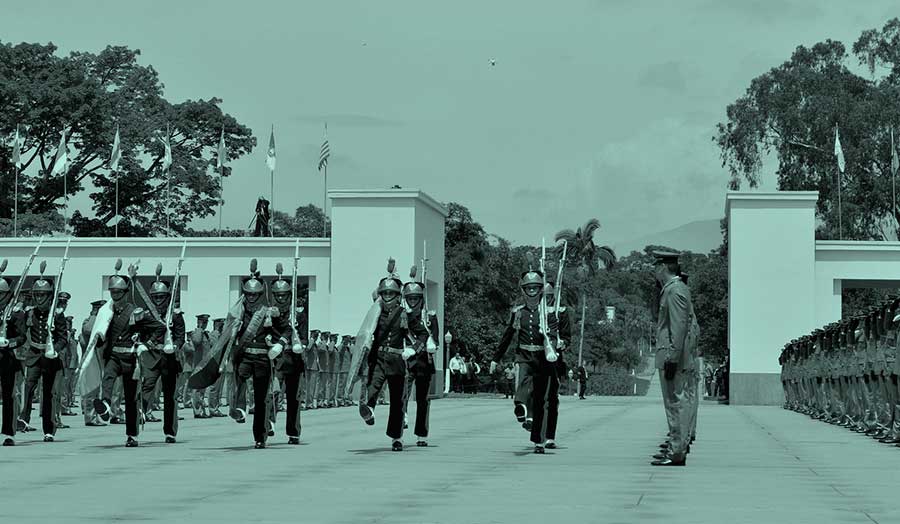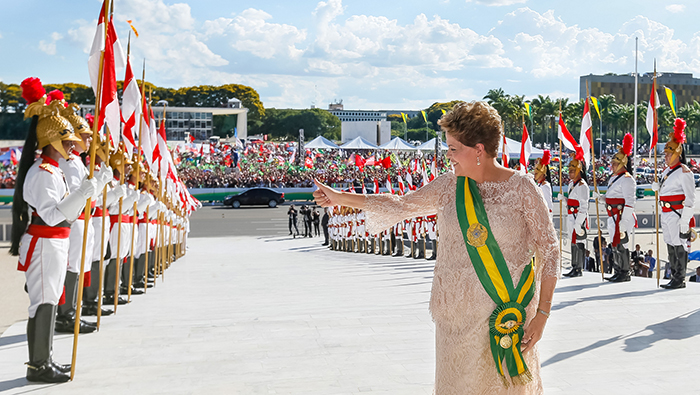Brazil’s political climate is as polarised and fractious as ever, and it’s getting nastier.
While some desperately attempt to impeach President Dilma Rousseff, a minority of right-wing protesters are openly asking for a military intervention.
This comes a year after a major report on the use of torture under the military regime that ran Brazil from 1964-1985. With those memories still so fresh, another military coup seems highly unlikely – but Brazil nonetheless faces real political problems with its armed forces, and they cannot be safely ignored.
Army chief Villas Boas recently discharged General Mourão from his position as head of the Southern Military Command. Mourão had viciously criticised Rousseff’s government, and had even called on army reservists to “awaken a patriotic battle”. Worryingly, some retired officers defended the sacked general.
But the military leadership clearly sees democracy as the only game in town. Politicians have significantly increased their control of the military since the return to democracy in 1985.
Still, generals can (and do) use their substantial political heft to defend their institutional interests, while civilian authorities often prefer to avoid conflicts with the commanders. This uneasy settlement is partly due to the notorious weakness of Brazil’s Ministry of Defence.
Only created in 1999, the ministry remains almost embryonic by the standards of national government departments. It still does not offer a career track for civilian bureaucrats. That means it’s dominated by military personnel, whom ministers often have to rely on to negotiate difficult political issues.
Celso Amorim, the former minister of defence and foreign affairs, has tellingly compared his experiences with the respective ministry’s bureaucracies: “In the Foreign Ministry, I could be a warrior. In the Ministry of Defence, I had to be a diplomat.”
Power struggle
Ideological differences have further complicated civil-military affairs ever since Luiz Inácio Lula da Silva won the presidential election in 2002. Some high-ranking members of his Workers’ Party were former insurgents against the military regime; his hand-picked successor Dilma Rousseff was one of them and became a victim of torture while a political prisoner.
Conversely, the armed forces still call the coup of 1964 a “democratic revolution” that saved Brazil from communism. Conservative military personnel and politicians oppose sensible steps towards more civilian supremacy. They want to keep the military free from the influence of “esquerdopatas”, or pathological leftists.
In September 2015, the military top brass was left fuming by a presidential decree that transferred their authority over most promotions to the Ministry of Defence. But the most crucial factor for their outrage wasn’t the decree’s content, but the government’s quite unfortunate way of handling the issue.
The executive order’s initial draft guaranteed that military commanders would keep their purview. But while Minister of Defence Jacques Wagner was on a leave of absence, the ministry’s secretary general, Eva Chiavon, pretended that the service commanders had consented to a modification that would strip away these prerogatives. The decree then came into effect with President Rousseff’s signature.
The military leadership swiftly pressured the government into issuing an erratum of the executive order, “sub-delegating” the responsibility of handling promotions back to the service chiefs. After this episode, the armed forces actually managed to increase their leeway in the Ministry of Defence.
Then, in the course of a cabinet reshuffle in October, Secretary General Chiavon was replaced by a retired army general. The military chiefs had always had their misgivings about the office of secretary general, which they saw it as a device to exert civilian influence over them.
Long road ahead
This was a missed opportunity to strengthen the civilian state’s hand. Military bureaucracies in general are notorious for their institutional inertia, and civilian overseers need to be assured they can appoint the officers whom they trust will steer them most effectively.
Make no mistake, military resistance against threats by supposedly ideological regimes and resistance to the appropriate role of civilians in military affairs are fraught problems for many countries.
But if Brazil wants to play a truly pivotal role in world affairs, it will need its armed forces to perform increasingly sophisticated missions and tasks – just as it is currently leading the military component of the UN peacekeeping mission in Haiti, for example.
Brazil’s armed forces must fully accept that it’s the civilian authorities who should give the marching orders, regardless of their expertise or party affiliation. Political steering isn’t improper micromanagement; it is the normal state of things in any democracy.
But civilian leaders also have to study up on military affairs if they want to counterweight the armed forces’ heft. Otherwise the military will continue to enjoy (and demand) preferential treatment. In the long run, this might be rather more consequential for Brazil’s democracy than a handful of hotheaded generals flirting with the restoration of military tutelage.


